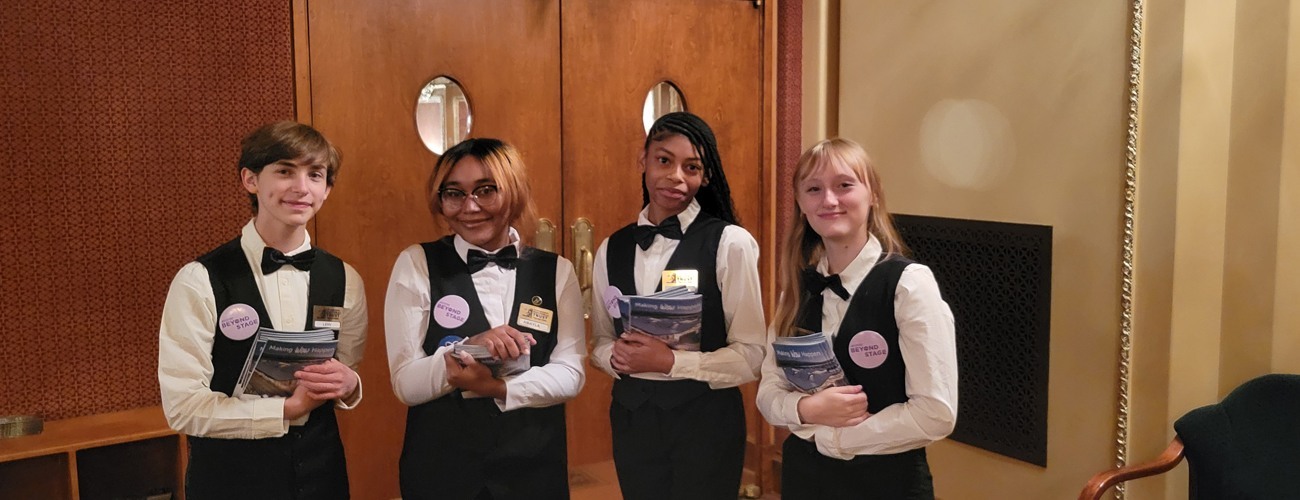More than three years ago, Vinay Thomas, Manager of Volunteer Services & Front of House Guest Experience, helped launch Beyond the Stage. Now, as he prepares to leave the Trust for a new opportunity, he reflects on the evolution of the program and its impact on students.
For high schoolers who are navigating the potentially exciting, often overwhelming prospect of preparing for their future, Vinay Thomas gets it.
"I know from my time as a student, especially as a high schooler, you're thinking about your next steps, you're maybe considering college, you're thinking about how you can better yourself," says the Trust’s Manager of Volunteer Services and Front of House Guest Experience.
Thomas has a suggestion for those students: try Beyond the Stage.
The Trust’s student volunteer program offers 9th through 12th graders the unique opportunity to take on guest-facing roles at shows and events. Along the way, students build professional skills and experience the arts up close.
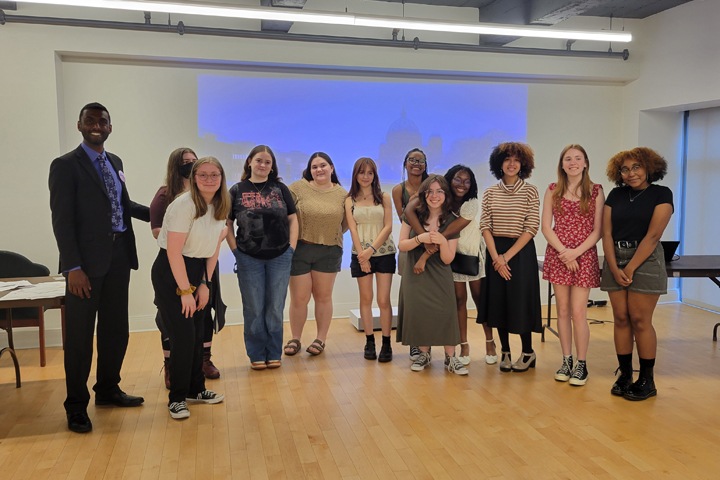
Vinay Thomas, far left, celebrates with students at the Beyond the Stage Award Ceremony.
Thomas, who helped establish this program three years ago, knows firsthand how powerful this kind of experience can be.
“In college, I got a music degree, but on the side, I would volunteer at the theater,” he explains.
As a classically trained musician, Thomas was used to performing on stage—but volunteering at Broadway shows introduced him to something entirely different.
"It was my ticket into theater," he says.
Not only that, his passion for student volunteerism opened the door to a career path.
A Brief History
When Thomas and his colleagues in Front of House Operations decided to launch the student volunteer program, they didn’t have to look far for their first participants. Pittsburgh CAPA—a magnet school just down the street—proved to be the perfect partner to pilot the initiative. Soon after pitching the idea to CAPA staff, the collaboration was underway.
“We had a vision of diversifying our volunteer corps. And by asking CAPA students to apply, we started expanding this opportunity to younger minds,” Thomas says.
In the first year, the team was able to recruit a cohort of 10 students. In the second year, that number doubled. And by year three, 30 students took part. Now, students from other Pittsburgh-area schools will have the opportunity to join the program.
“The point is, we don’t want to limit this,” Thomas explains. “We want any student in the high school age range to at least know about this opportunity and, if possible, to take advantage.”
For Thomas, the steady growth in participation has been encouraging. But the real reward has been watching the students grow.
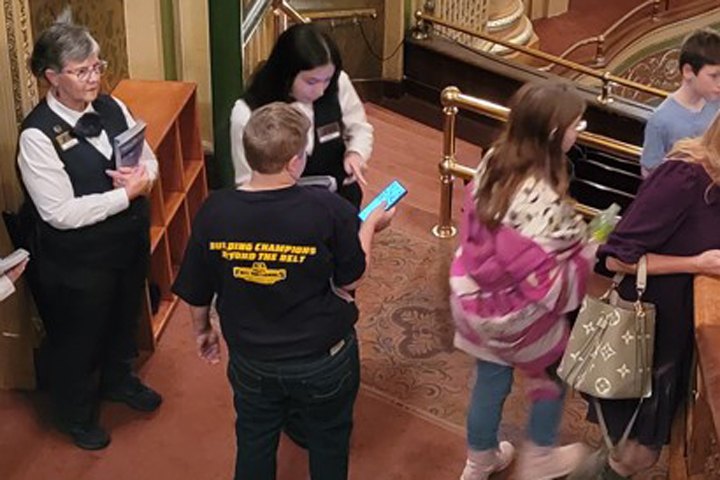
A student volunteer helps a patron find their seat in the Benedum Center.
Setting the Stage for Personal Growth
Beyond the Stage volunteers take on responsibilities similar to any Front of House team member. During their shifts, they scan tickets, greet patrons and guide them to their seats, manage the coat check, and provide donor lounge support.
Thomas says these responsibilities help students gain important social and professional skills.
“You're interacting with people. You're helping resolve conflicts. You’re showing professional commitment: being on time, showing up in uniform, working with managers.” But the learning, and fun, doesn’t stop there.
Beyond the Stage volunteers also meet with Cultural Trust staff, including leadership. They go on backstage tours and watch traveling productions load into the Benedum. And they get to see other Cultural Trust venues, including a Liberty Magic tour with a few tricks thrown in. “It’s not just that they're showing up at this time to do this task,” Thomas explains. “They’re getting a full experience of what it's like to be in a performing arts organization and learn about nonprofit leadership.”
In addition to understanding how a theater is run, students also learn how to help visitors feel comfortable in those spaces. After attending an accessibility training, one student explains:
“We learned how to better accommodate people who need extra support, which is incredibly important to me as someone who may need to use those things and has a lot of friends with various disabilities or other abilities.”
Leading By Example
After seeing how much students grew during that first year, Thomas invited returning volunteers to take on leadership roles and serve as mentors.
“From year two and onward, the trainings became student-led,” he says. “I’ll do an initial introduction, but the breakout sessions, role play, and venue tours are all led by the students.”
Students also have the opportunity to develop their speaking skills during CAPA school assemblies, where Thomas invites them to present. He reflects on the first assembly when students took the mic:
“That was probably one of my prouder moments, even though it wasn't a theater shift. I didn't tell them what to say. I just said, ‘Hey, just talk about your experiences’ and they’ve chosen to speak so positively about the program in front of people and show that leadership.”
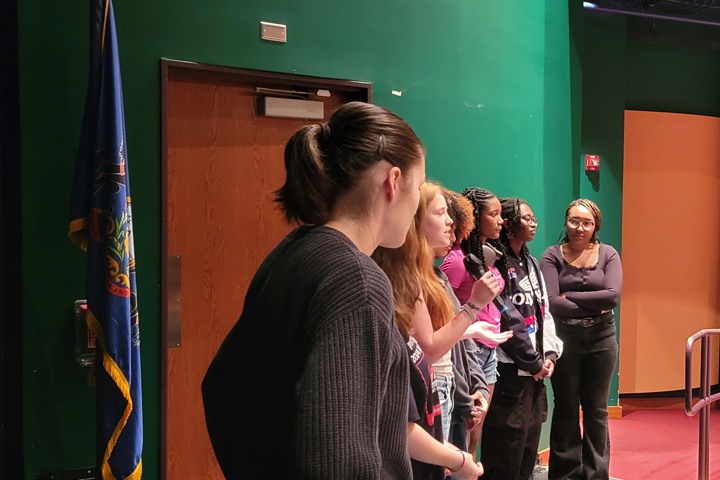
Current student volunteers speak share their experience with their peers at a CAPA assembly.
These moments, he says, are helping students shape their futures.
“We've had students graduate and go off to bigger and better things. This experience has helped them get into college, land summer jobs, or secure internships. I’ve written them recommendation letters. It’s something they can speak about in interviews and add to their applications.”
Beyond resume skills, Thomas believes these students can discover their own connection to the arts through volunteerism, just as he did.
“My hope is that these experiences will also make them lifelong patrons of the arts, no matter what they do.”
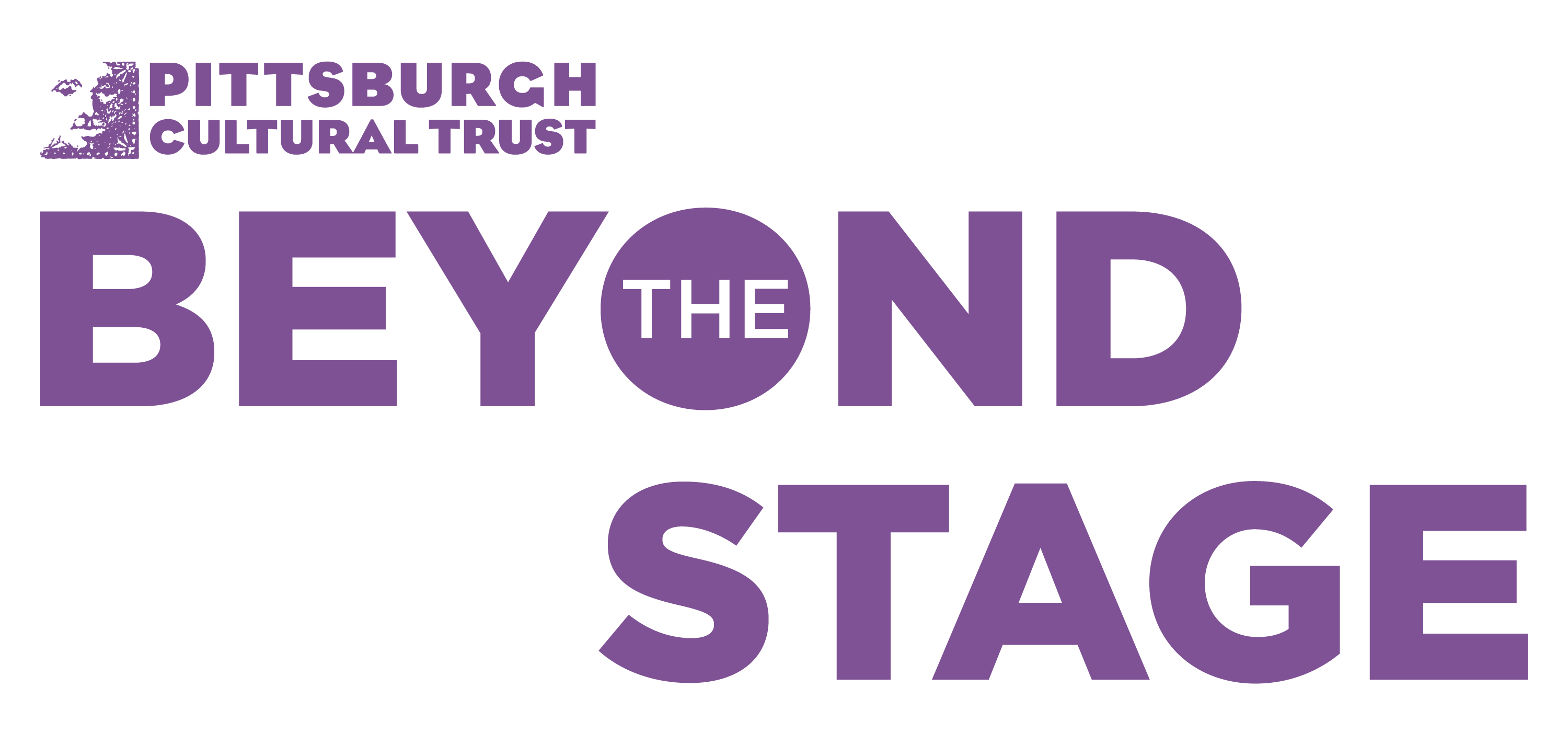
If you’re ready to go Beyond the Stage, or you know someone who might be interested in joining, applications are always open! Students can apply for this opportunity at any time of the year.
APPLY NOW